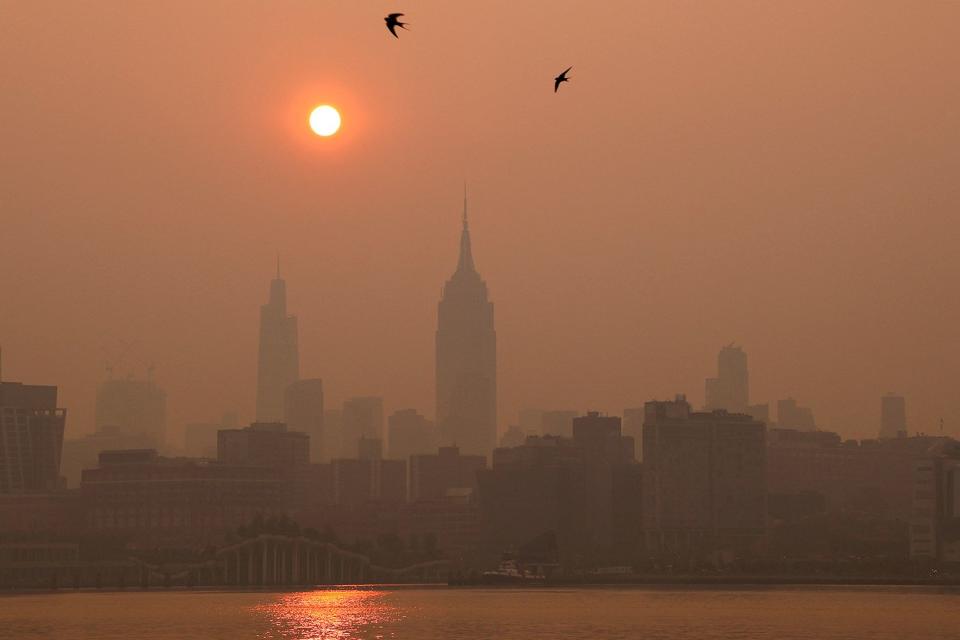Air Pollution During Wildfire Season: Should You Wear a Mask? Here's What to Know
Using masks and filtration systems — and staying indoors — can help keep you safe as smoke from Canadian wildfires spreads to the US

Gary Hershorn/Getty
New York City under a blanket of wildfire smokeThe devastating wildfires in Canada are affecting the East Coast of the United States, blanketing areas in thick smoke and causing air quality to plummet.
Conditions were so dire this week that many schools implemented indoor recess, and Major League Baseball, the National Women's Soccer League and the WNBA postponed or canceled games.
On June 6, New York City experienced the highest pollution level in the world. Acting State Health Commissioner Dr. James McDonald also recommended that "New Yorkers limit strenuous outdoor activity to reduce the risk of adverse health effects."

Getty Images
Wildfires in CanadaAnd this could only be the beginning, as the Washington Post notes that fire season in Canada is expected to last throughout the summer.
This season's fire season in Canada has already been "ferocious” — marked by an amount deemed atypical this time of year by the National Environmental Satellite, Data and Information Service. "Roughly a million acres have burned, and more than 29,000 people in Alberta and British Columbia were forced to evacuate their homes," according to the organization.
Related: Why Is the Sun Red? All About the Air Quality Index and What It Means for Your Health
But as the smoke spreads, those with lung diseases like asthma and COPD, as well as children and the elderly, are at risk of suffering adverse side effects.
Children are at particular risk from wildfire smoke because their lungs are still developing, warns the Environmental Protection Agency.
But there are simple things you can do to keep you — and your loved ones — safe.
Wear an n95 Mask
“The point is to use the best available mask you have access to,” New York’s McDonald said during a briefing. “If you have a surgical mask, that will give you some protection, but N95 and KN95 are better masks to use in times like this.”

Getty Images
N95 respirator maskNever miss a story — sign up for PEOPLE's free daily newsletter to stay up-to-date on the best of what PEOPLE has to offer, from celebrity news to compelling human interest stories.
Monitor the Air Quality Index
Most cell-phone weather apps include this data, but monitoring the US Air Quality Index can help vulnerable groups make a plan of action. When the Air Quality Index hits 101, that means conditions are unhealthy for sensitive groups.
Use an Air Filtration System
Especially for those with heart disease, asthma or other respiratory conditions — as well as homes with elderly and or young members — the CDC recommends using “a freestanding indoor air filter with particle removal.”
Related: New York City Recorded World’s Worst Air Pollution on Tuesday Thanks to Canada Wildfires Smoke
Stay Indoors
“The best way to stay safe from #wildfire smoke is to stay indoors,” the CDC advises. So keep those windows closed — and keep sensitive groups out of harm’s way. And while indoors, avoid burning candles or incense, which can further irritate sensitive lungs.

Getty Images
Keep those windows closedStaying indoors is especially recommended for sensitive children, as the CDC notes that n95 masks often don’t fit children. “Dust masks, surgical masks, bandanas and breathing through a wet cloth will not protect your child from smoke,” the agency points out.
Don’t Vacuum
Really. The CDC cautions that “vacuuming stirs up particles already inside your home.” So give the vacuum a break while the air quality is poor.
For more People news, make sure to sign up for our newsletter!
Read the original article on People.

